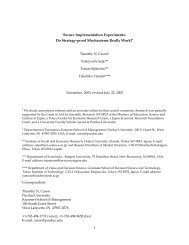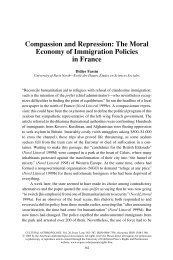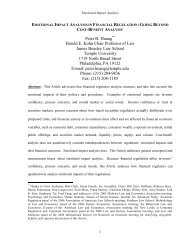Governance, Growth, and Development Decision-making - School of ...
Governance, Growth, and Development Decision-making - School of ...
Governance, Growth, and Development Decision-making - School of ...
You also want an ePaper? Increase the reach of your titles
YUMPU automatically turns print PDFs into web optimized ePapers that Google loves.
<strong>of</strong> its better educational institutions, because <strong>of</strong> its greater state<br />
capacity enabling the provision <strong>of</strong> the basic public goods, because <strong>of</strong><br />
its greater financial development, or because <strong>of</strong> the political institutions<br />
that South Korea developed gradually after separation.<br />
2. There Is No General Recipe for Improving<br />
Institutions<br />
Exporting good economic institutions is as hopeless as exporting<br />
democracy. Institutional reform is essential for many societies to<br />
unleash their growth potential <strong>and</strong> it can happen as exemplified by<br />
successful cases <strong>of</strong> institutional reforms ranging from South Korea<br />
to Botswana. But such reform must have internal driving forces <strong>and</strong><br />
what types <strong>of</strong> reforms can be successful will vary from country to<br />
country.<br />
Importantly, the experience <strong>of</strong> both South Korea <strong>and</strong> Botswana<br />
highlights two important features <strong>of</strong> successful reform that we<br />
should bear in mind. First, history is not destiny. Countries can, <strong>and</strong><br />
do, change in major ways <strong>and</strong> such change is what gives us hope that<br />
economic development will be more widespread during this century<br />
than the past one. In fact, a distinguishing feature <strong>of</strong> the underst<strong>and</strong>ing<br />
that institutions matter is also the recognition that institutions,<br />
as the collective choices <strong>of</strong> the society as a whole, can be changed<br />
to improve the living conditions in a country. We do not have the<br />
recipe for successful institutional change. But the idea that institutions<br />
can change should be an important part <strong>of</strong> our approach to<br />
less-developed economies <strong>and</strong> should give us hope about the future.<br />
Second, reform <strong>and</strong> the subsequent development <strong>of</strong> institutions<br />
must <strong>of</strong>ten rely on internal dynamics. In South Korea <strong>and</strong> Botswana,<br />
<strong>and</strong> in other cases, the path <strong>of</strong> institutional improvements would not<br />
have been possible without the participation <strong>and</strong> support <strong>of</strong> their<br />
population. Although there are cases, such as Germany <strong>and</strong> Japan<br />
after World War II, where external intervention played an important<br />
role in the subsequent development <strong>of</strong> institutions, these are exceptions<br />
rather than the rule. Our best hope for institutional improve-<br />
Daron Acemoglu 3
















